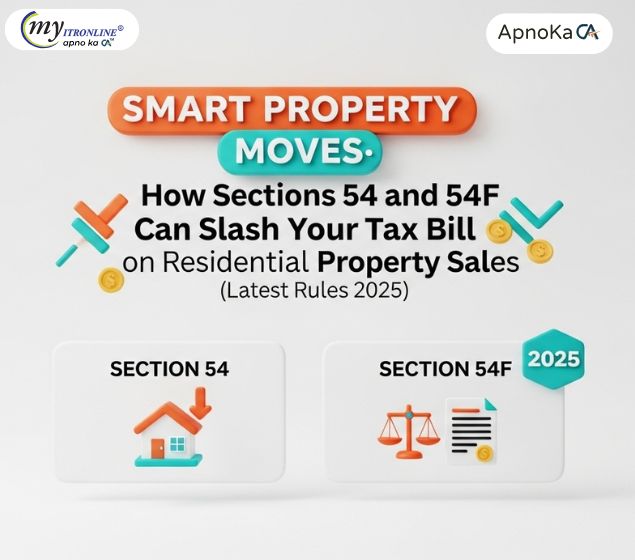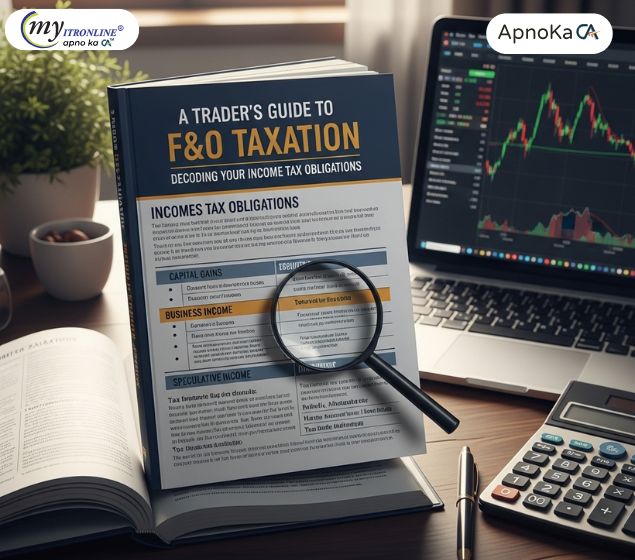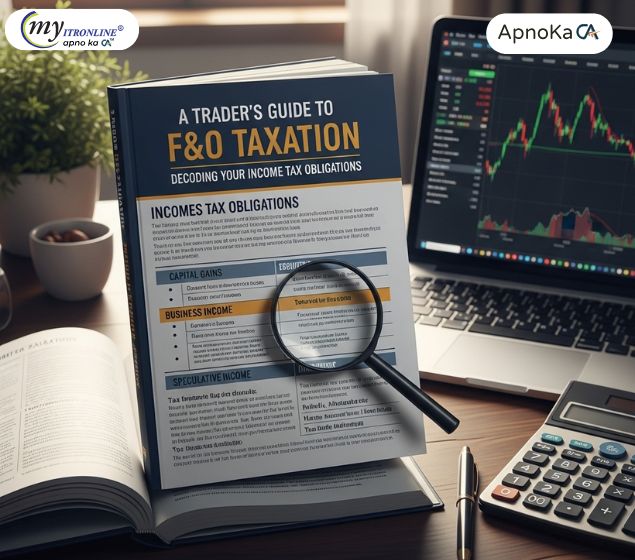# indiantaxlaws
12 posts in `indiantaxlaws` tag

Smart Property Moves: How Sections 54 and 54F Can Slash Your Tax Bill on Residential Property Sales (Latest Rules 2025)
Discover how Sections 54 and 54F of the Indian Income Tax Act provide crucial tax exemptions on Long-Term Capital Gains from property sales. This comprehensive guide covers the latest rules for 2025, including the new ₹10 Crore cap and the two-house option under Section 54, offering practical examples and a step-by-step plan for effective tax planning.

A Trader's Guide to F&O Taxation: Decoding Your Income Tax Obligations
This guide explains the crucial aspects of Futures & Options (F&O) taxation in India. It clarifies that F&O income is categorized as 'Non-Speculative Business Income', detailing how to calculate turnover based on 'absolute profit' plus premiums. The guide outlines various deductible expenses to reduce taxable income and explains when a tax audit is mandatory, especially for losses or specific turnover thresholds. Finally, it covers how to manage F&O losses through set-off and carry-forward, and provides essential information on ITR filing (ITR-3), applicable tax rates, and advance tax payments, ensuring traders stay compliant and manage their finances effectively.

A Trader's Guide to F&O Taxation: Decoding Your Income Tax Obligations
This guide explains the crucial aspects of Futures & Options (F&O) taxation in India. It clarifies that F&O income is categorized as 'Non-Speculative Business Income', detailing how to calculate turnover based on 'absolute profit' plus premiums. The guide outlines various deductible expenses to reduce taxable income and explains when a tax audit is mandatory, especially for losses or specific turnover thresholds. Finally, it covers how to manage F&O losses through set-off and carry-forward, and provides essential information on ITR filing (ITR-3), applicable tax rates, and advance tax payments, ensuring traders stay compliant and manage their finances effectively.
.jpg)
100% Penalty Alert: Complying with Cash Transaction Limits (269SS, 269T, 269ST)
This blog post provides a comprehensive yet easy-to-understand guide to Sections 269SS, 269T, and 269ST of the Indian Income Tax Act. It explains the rules regarding accepting and repaying cash loans/deposits (above ₹20,000) and receiving cash amounts (above ₹2 lakh) for various transactions. The post emphasizes the severe penalties (100% of the amount) for non-compliance, clarifies exemptions, and details how these transactions are reported in Form 3CD during a tax audit. It concludes with practical takeaways for taxpayers to ensure compliance and avoid issues.
.jpg)
CBDT’s New Form 49C Rules: Stricter Tax Compliance for Non-Residents in India
Stricter guidelines have been implemented by the Central Board of Direct Taxes (CBDT) for foreign nationals submitting Form 49C in India. Enhancing openness and guaranteeing adherence to tax regulations are the goals of these modifications. Important changes include more stringent penalties for non-compliance, obligatory digital filing, and expanded disclosure requirements. In order to prevent fines and operating delays, non-resident businesses are now required to keep proper records and follow more stringent filing deadlines.
.jpg)
A Complete Guide to Preventing Tax Notices for NRIs
can be difficult to manage income tax as an NRI, and even small mistakes could result in tax notifications. The top 5 tax notifications that non-resident Indians (NRIs) frequently receive are highlighted in this blog. These notices include non-filing of returns, income mismatches, unreported income, suspected tax evasion, and faulty returns. It offers helpful advice on how to prevent these letters, including timely filing, correct income declaration, making use of DTAA advantages, and speaking with tax experts. NRIs may guarantee hassle-free tax compliance and steer clear of fines by being proactive and knowledgeable.

Leveraging Sections 54 and 54F for Tax Exemptions in Property Transactions
This blog explores Sections 54 and 54F of the Indian Income Tax Act and explains how they exempt individuals and HUFs from paying taxes on capital gains when they reinvest them in residential real estate. To ensure clarity for taxpayers, the essay also discusses frequent disagreements, court rulings, and helpful advice for claiming exemptions.
Understanding Section 139(5) of the Income Tax Act: A Comprehensive Guide
A thorough explanation of Section 139(5) of the Income Tax Act can be found in this blog post. It describes what a defective return is, how to fix a defective return, and the possible repercussions of filing a defective return. Taxpayers can guarantee compliance with income tax legislation and prevent penalties by being aware of Section 139(5).
.png)
Form 1 of DTVSV 2024: Online Filing, Deadlines, and Penalties
Form 1 for the Declaration of Taxable Value of Securities (DTVSV) 2024 is now available for online submission. By October 31, 2024, taxpayers who own securities as of March 31, 2024, must submit this form. Up to December 31, 2024, a late return may be submitted; however, there will be a ₹1,000 penalty. In the event that the form is not submitted by the stipulated deadline, there will be a penalty of ₹10,000 and potential interest on unpaid taxes. Find out how to easily file Form 1 online and make sure you're following the DTVSV rules.

FY 2023-24 Income Tax Audit Simplified
The income tax audit process for FY 2023-24 can be challenging, but with the right preparation, businesses and individuals can manage it effectively. This blog explores who is required to undergo an audit, how to prepare by gathering essential documents like Form 16 and Form 26AS, and the steps involved in the audit process. Engaging a Chartered Accountant (CA) is key to ensuring compliance with tax regulations. The audit process also provides opportunities for improving financial record-keeping, tax planning, and dispute resolution. This guide offers insights into navigating the audit process confidently.

Section 194R of the Income Tax Act: A Complete Guide
The Income Tax Act's Section 194R, which addresses the tax deduction at source (TDS) on payments made to resident contractors or professionals, is covered in detail in this blog. It goes over the main points of the section, such as the tax rate, exemptions, threshold amount, and penalties for not complying. The blog also gives advice on how to ensure compliance and offers insights into the real-world applications of Section 194R.

Section 57 Deductions - Income Tax Act
A thorough explanation of Section 57 of the Income Tax Act, which permits deductions against income subject to the "Income from other sources" head, is given in this article. It describes the several types of deductions that are permitted under Section 57, including as interest or dividends on tradable financial assets, employee contributions to welfare programs, costs related to rental revenue, and more. The purpose of the essay is to assist taxpayers in comprehending the nuances of Section 57 and in making well-informed decisions regarding their tax compliance and planning.
